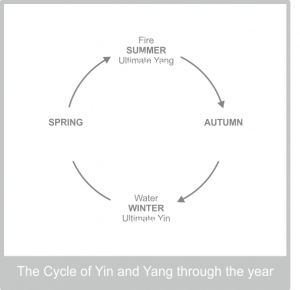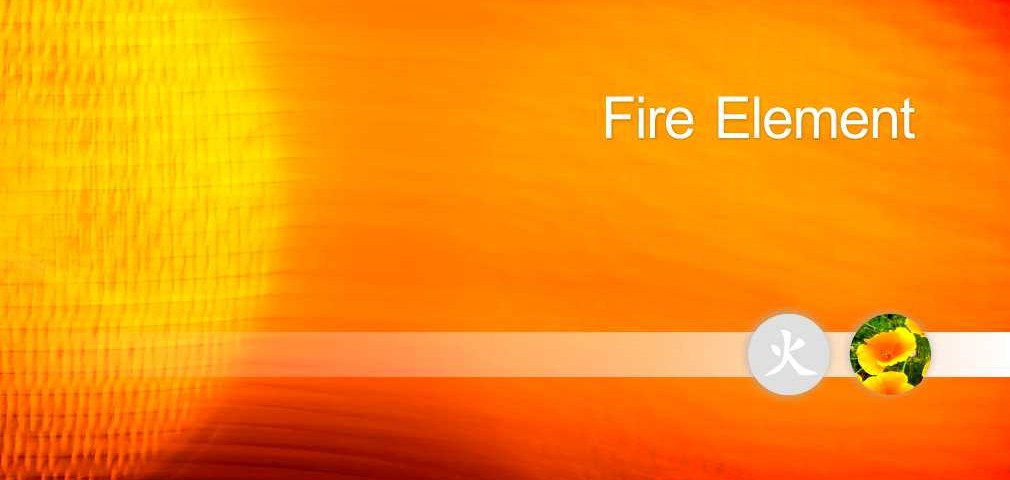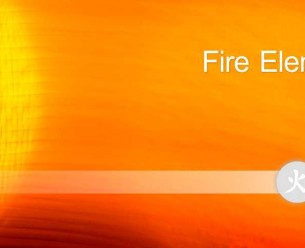The Importance of the Heart
In Chinese Medicine the Heart is extremely important. In fact, within the Chinese system, the Heart and the Kidneys are generally considered to be the two most important organs.
This may seem a little strange because obviously, good health requires optimum functioning of all the organs – in order to explain further we need to look a little more closely at Chinese theory.
The two main facets of Chinese philosophy are both conceptual. First we have the concept of Yin and Yang and then that of the Five Elements.
The Five Elements of Water, Wood, Fire, Earth and Metal, describe the different forces in nature and are associated with different seasons, organs, emotions, senses and colours.
The Heart, Small Intestine, Pericardium and Triple Burner are the organs of Fire. Fire represents summer, joy and lack of joy, love and the colour red. The Kidneys on the other hand are the Water Element and relate to winter and fear/lack of fear and the colour blue.

If we move on to look at the concept of Yin and Yang the importance of the Heart and the Kidneys becomes clearer. This is because Yin and Yang come before the Five Elements and are seemed to be the very foundations of everything. Yin is calm and cool and female whereas Yang is hot, active and male. Water and winter are ultimate Yin and Fire and summer are ultimate Yang. The Heart and the Kidneys are the foundations on which all the other elements are built and their health and their relationship to one another are extremely important to a persons overall well being. Even on an emotional level the with Water and Fire we have the two fundamental emotions of love and fear.
Due to this essential Yang essence the areas dominated by the Heart tend to be relatively ‘Yang’ in nature. For example, the Heart governs the tongue and is associated with talking and expressing oneself, making connections and forging relationships. It is also associated with the Shen or Spirit – that which makes us who we are, unique in all the world.
The Role of the Heart
In Chinese Medicine the Heart, is held in such high esteem, is referred to as the ‘Emperor’ or the ‘Supreme Controller’. Some traditions even advocate that the points of the Heart channel should not be treated at all as they are too sacred. In this tradition points on the other Fire channels would be used instead.
Essentially, this reverence for the Heart is because the Heart houses the Shen or the Spirit and it is the Shen that gives life its meaning.
The Shen is our highest potential – is where all our greatest truths, our grandest thoughts, our greatest dreams and our highest wishes come from. It gives us compassion, integrity, purpose and peace.
Also contained within the Heart is the place of pure potential where our consciousness can connect to the Great Tao – the truth of all nature. If we follow are Hearts and live according to our Shen we experience joy.
However, the Shen is so ephemeral and so refined it can easily be disturbed. It is said that for the Shen to shine the Heart must be serene and in order for the Heart to be serene, the rest of the body must be in good health so that it can protect its peace and tranquillity.
Nevertheless, more important even than health, is the need to cultivate our ability to communicate with the Heart and through it, the Tao. For this, above all things will provide us with the inner stability require to navigate the inevitable vicissitudes of life and eventually death, with peace and grace.
For this reason mediation is a particularly beneficial practice for the Heart and the cultivation of joy.
Functions of the Heart
1. Governs the Blood and Dominates the Blood Vessels
In Chinese Medicine blood is said to be manufacture in the bone marrow. It is also taught that the food we eat is of vital importance. Gu Qi (that is the Qi that we obtain from our food) is sent from the Spleen to the Lungs and from there it is pushed on to the Heart. The Heart is then said to use the Original/Yuan Qi of the Kidneys to transform this energy into blood.
In Western medicine blood is produced in the bone marrow and recycled and released into the body via the Spleen. We can also see that there is a direct path from the lungs to the heart but the idea that the blood is made in the heart is somewhat unusual. It is important to remember the difference in emphasis here in the two modalities. In Chinese medicine the concept of ‘Blood’ is much more than a mere substance, the Blood is said to house the Shen or Spirit so perhaps the point here is that until the blood pumped from the Spleen to the Lungs reaches the Heart it is not complete as it does not yet contain this vital spiritual element.
Otherwise though this function of the Heart links very closely to the Western understanding of the cardiovascular system. In both traditions it is understood that a healthy heart will pump blood around the body and through the other organs, smoothly and efficiently, constantly responding and adapting to change. This constant flow through the blood vessels provides nourishment and removes wastes maintaining vitality and wellness.
Again, as in Western medicine, the Heart is assisted by other organs in this vital task. The Chinese say that the Liver ‘Stores the Blood’, the Spleen ‘Controls the blood’ and the Lungs ‘Control the channels and the blood vessels’.
From a Western perspective we know that whilst conducting its vital work the liver really does hold a large volume of blood and any one time. It also processes and stores nutrients, and vitamins from the blood and distributes them both within its own cells and throughout the muscles. In Western theory the Spleen is also heavily involved with the blood, as it filters the blood to support the immune system, recycles old red blood cells and also stores white blood cells and platelets. The lungs are intimately linked with the heart both geographically and through respiration. In Chinese terms the combined energy of the Heart and Lungs is called Zong Qi. Interestingly in the West we talk of the blood being made up of red and white cells. The red cells ‘House’ and transport oxygen and the white blood cells protect us from attack. This links very closely to the roles of the Heart in Chinese medicine (which is associated with the colour red) and the Lungs, which are said to control the immune system and is associated with the colour white.
The health of the heart and the health of the vessels are dependent on one another and both are dependent on strong Heart Qi and Blood. Without these the pulse will not be strong and regular and the body will not be properly nourished.
Symptoms of weak Heart Blood include: mild palpitations, cold hands and feet, insomnia, poor memory, pale complexion, anxiety and depression and feeling somewhat disconnected from reality.
2. Houses the Mind and Shen
In Chinese tradition it is said that the mind and the Shen are housed in the Heart, more specifically the Heart Blood. The Shen in Chinese medicine is our spirit, the most sacred part of us that is unique and timeless. It is the essence of our spiritual life and when we have strong Shen it is said to bring great joy. Therefore, strong, Heart Blood and Yin will result in a clear and calm consciousness, a quick mind, the ability to feel and cope with our emotions, a strong memory and the ability to let go, relax and enjoy.
This may seem to contrast sharply with the western understanding of the minds location in the brain but actually, recent research has shown that the heart does indeed play a major role in memory. This has been validated by research that shows that heart transplant recipients often experience the memories of the heart’s donor (Dr. Paul P. Pearsall, The Heart’s Code).
Let us think again about the foundations of Chinese medicine, Yin and Yang. Within the Five elements these are represented by Fire and Water. The Heart is the major Fire/Yang organ of the body and the Kidneys are the major Water/Yin organ. In Chinese medicine the Kidneys are linked to the brain and are said to House Zhi or the Will. Strong Zhi results in a purposeful and focused mind that gives us direction and determination. It is the Zhi that helps us to follow our dreams and fulfil our destiny.
The Shen of the Heart on the other hand is connected to consciousness itself. It is associated with feeling, being, remembering, and empathising. It is the Heart that helps to show us the way, igniting with delight when it recognises the right path.
From the Chinese description it would seem that the Heart brain is the most ancient and wise aspect of ourselves, sadly it is also the part most neglected in our modern world…
3. Manifests in the complexion
This function links to the connection with the Shen. It is said that when the Shen is strong it will radiate from the eyes and the face. There is also a more physical explanation due to the rich blood supply to the face. If the Heart Qi is strong, the circulation and the blood will be strong and the complexion will be well nourished. The face with look vibrant and healthy. If the circulation is weak, this lustre will be lost and the face will be pale and wan. Excess conditions of the Heart can lead to flushed cheeks and face or a bluey or cyanosed hue.
4. Opens into the tongue
In Chinese Medicine, each of the Yin organs is linked to one of the sensory organs. In this case the Heart is linked to the tongue. In a physical sense there is a deep pathway that connects the Heart channel, and therefore, indirectly the Heart itself, to the base of the tongue.
The Heart is also linked metaphorically to speech. With the need to speak ones truth and communicate from the Heart. In order to do this however, the Heart has to be in good health. It there is deficiency in of Heart Qi, there may be a tendency to shy away from expressing ones self or one may be inappropriately open, talkative or closed.
5. Controls sweat
Besides controlling blood, another Heart function is to control sweat, which is one of the body’s fluids. Too much sweating can not only lead to dehydration, but also to a deficiency in other fluids, such as Blood. Spontaneous sweating can indicate Heart Qi deficiency and night sweating can be a sign of Heart Yin deficiency.




